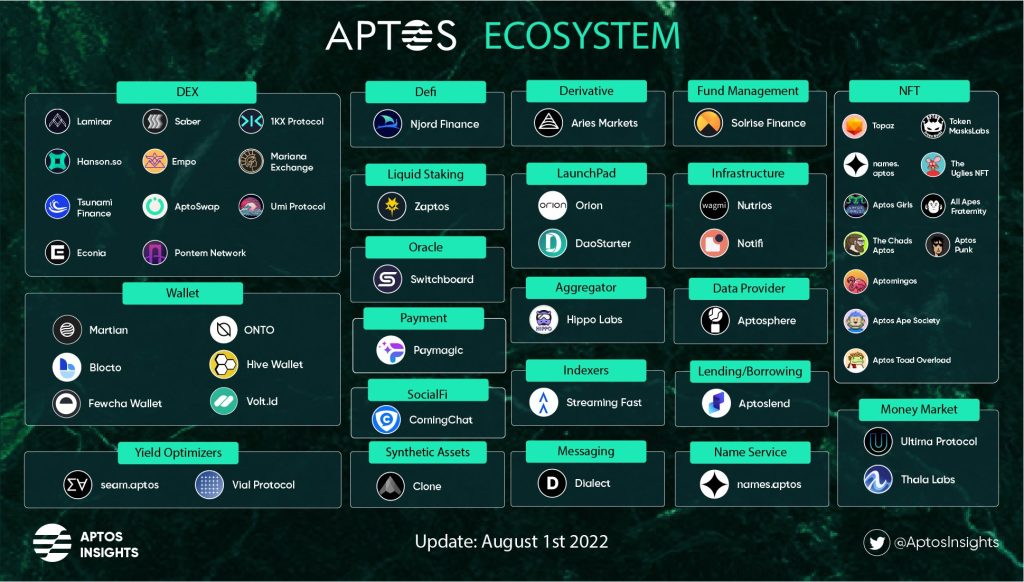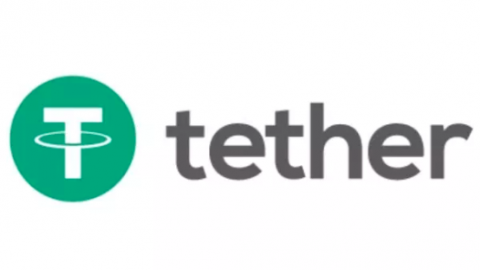Aptos, a new layer-1 challenger is heading for a duel with Solana to see who’s the fastest draw in the Wild West of Cryptoland. This comes just as Solana and others challenged Ethereum, which recently completed a historic Merge to future-proof its now PoS network, for supremacy in 2021. Known as a “Solana-killer”, the new chain Aptos, which hasn’t even officially launched yet, is getting people excited with transactions per second (TPS) that leave rivals in the dust, incredible security and scalability potential, and an impressive developer team that has attracted heaps of venture capital from a truly stacked lineup of crypto’s most reputable investors.
With an ecosystem that’s already starting to fill out nicely – decentralized finance (DeFi), decentralized exchanges (DEXs), non-fungible token (NFT) platforms, and all the rest – Aptos is starting to look like the dark horse chain that’s been quietly learning from the mistakes of everyone else before entering the race.
In this article, we’ll do a deep dive into where Aptos came from, what it’s all about, and survey what’s happening there now.
Who is the team behind Aptos?
Aptos is the brainchild of two former senior developers at Meta, Avery Ching and Mo Shaik. The pair had worked on Meta’s (then Facebook) blockchain project Diem (formerly Libra), which eventually fell apart due to regulatory obstacles. Much of the core team is composed of Diem veterans. The project is distinct from fellow upcoming rival chain Sui, which shares some roots with the old Diem team.
The primary selling point of Aptos is a transaction-ordering technique called “parallel execution” that was first theorized for Diem. The method attempts to vastly speed up transactions compared to other blockchains while keeping them inexpensive.
While parallel execution seems extremely promising on the testnet, the Aptos mainnet has yet to go live. At the same time, attracting programming talent in the hyper-competitive world of blockchain development will be another challenge. Nevertheless, none of this has prevented the Aptos team from raising hundreds of millions of dollars in capital from the likes of FTX and Andreessen Horowitz (a16z).
What makes Aptos special?
Probably the major selling point of the Aptos chain is that it is able to hit 130,000 TPS on its testnet and pull this off without trading security or stability. To put things in perspective, Ethereum currently can handle about 30 TPS, and Solana is supposed to be able to do about 65,000. This issue of transaction speed, along with the pedigree of the two Aptos founders, has been foremost in a lot of the media coverage of the project.
Move: safe and customizable programming language
The chain uses a special Rust-based programming language called Move, which had been developed originally for Diem. Move is an executable bytecode language with secure global storage and uncopyable custom resources that make it a hard target for bad actors seeking to take over the Aptos network.
Parallel execution
Typically, blockchains use a sequential execution method for ordering transactions. All the crypto flows pile up on the ledger and get validated by nodes. Since everything must happen in series with this method, inevitably, it slows the settlement process down.
With Aptos, Block-STM technology enables the chain to process transactions concurrently. Then they all get validated after the execution. If a transaction fails, it simply gets re-executed, and the STM libraries handle conflicts that emerge and prioritize necessary transactions.
While Solana also uses a form of parallel execution, the network’s occasional disruptions have opened up some space for competition. Aptos is also said to be more reliable due to its network redundancy features that allow backup nodes to take over when the leader nodes fail.
Byzantine fault tolerant consensus protocol
The Aptos team liberated its consensus protocol from having to trail behind the transaction order, and the two processes operate in parallel. Aptos uses a Byzantine fault-tolerant consensus protocol that scrutinizes individual states and communicates with validators to update them when necessary.
Has Aptos launched yet?
No, not yet at the time of writing (September 2022). Aptos is currently in its testnet stage and hasn’t yet launched its mainnet. The testnet kicked off in March of 2022 and has seen millions of transactions processed, with tens of thousands of nodes already in place. There are over 100 projects operating on the chain, and incentivizations are offering developers and users rewards for stress-testing the system.
The testnet process is happening in four stages, the last of which will be fully open to anyone. An announcement by the company states that the mainnet will launch in the autumn of 2022. A token does not yet exist but will launch around the time of the mainnet.
The Aptos ecosystem- what are its hottest Dapps?

Aptos is doing its best to claw developers from rivals, and so far the slate of projects shows that its efforts have been working reasonably well. The Aptos Discord channel has grown to over 60,000 users. Around 8,000 of these are developers. Here is a list of some of the major projects getting started on the new blockchain.
Martian Wallet
Put together by Martian DAO (decentralized autonomous organization), the Martian Wallet has over 100,000 downloads and is one of the first DApps Aptos new users are steered towards.
Pontem Network
Pontem Network is creating an automated market maker (AMM) DEX and a native wallet to go with it. The team’s DApp has over 10,000 downloads.
Econia
Econia is building a fully on-chain central limit order book (CLOB) for Aptos.
Aries
The team at Aries is at work on a margin-trading DEX that takes advantage of Econia’s CLOB.
Zaptos
Zaptos is setting up a liquid staking protocol on-chain.
Topaz
Topaz is making an NFT marketplace for Aptos with a UI resembling that of OpenSea.
Who is funding Aptos?
In March of this year, Aptos secured its first round of funding to the tune of $200 million from many notable venture capital firms, including Multicoin Capital, a16z, Hashed, Three Arrows Capital, Tiger Global, Coinbase Ventures, and FTX Ventures. Then in June, it scored another $150 million from FTX Ventures and Jump Crypto.
Is Aptos better than Solana?
So how good is Aptos, and is it better than Solana? As an elite Web3 hardware wallet provider, we don’t pick sides at CoolWallet, but rather on providing the best cold storage support for coins like Solana and other layer-1s and 0s like Avalanche, BSC and Cosmos. Still, while Aptos is showing incredible potential, it’s certainly hard to bet against Solana, probably the hottest chain of 2021, which continues to garner huge network effect and NFT and crypto gaming adoption, despite also still being in beta itself. For a deep technical comparison between the two chains, take a look here instead.
Conclusion
Aptos is extremely well capitalized – to the extent that if some of these VCs were to topple in the bear market, the consequences could impact the project. And yet this is probably not the foremost on anyone’s mind while the chain is still in its testnet stage and garnering a buzz worthy of a major new entrant in the field.
It remains to be seen how the story will play out for Aptos, but it sure seems like the team is taking advantage of the bear market to build its way into a strong position for the next bull cycle.
Aptos will certainly be on the top of the list for CoolWallet Pro support upon its launch.




